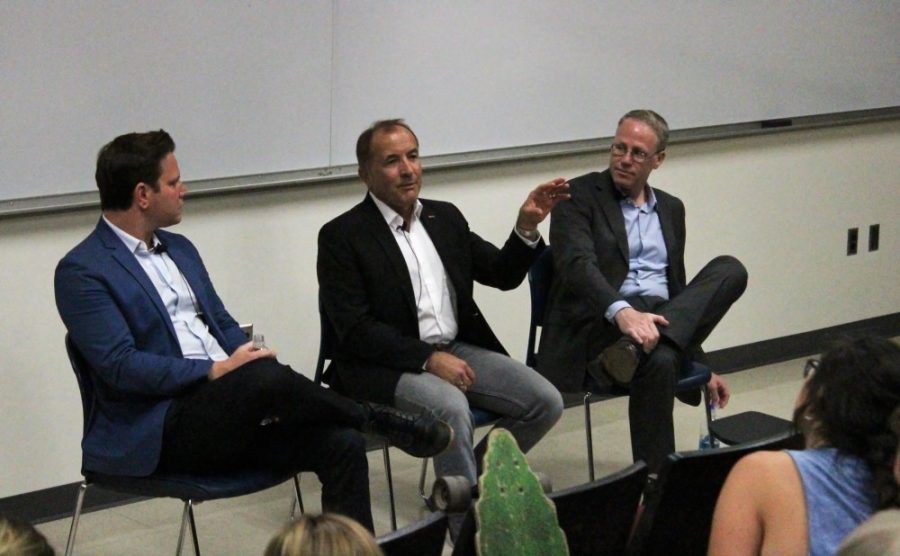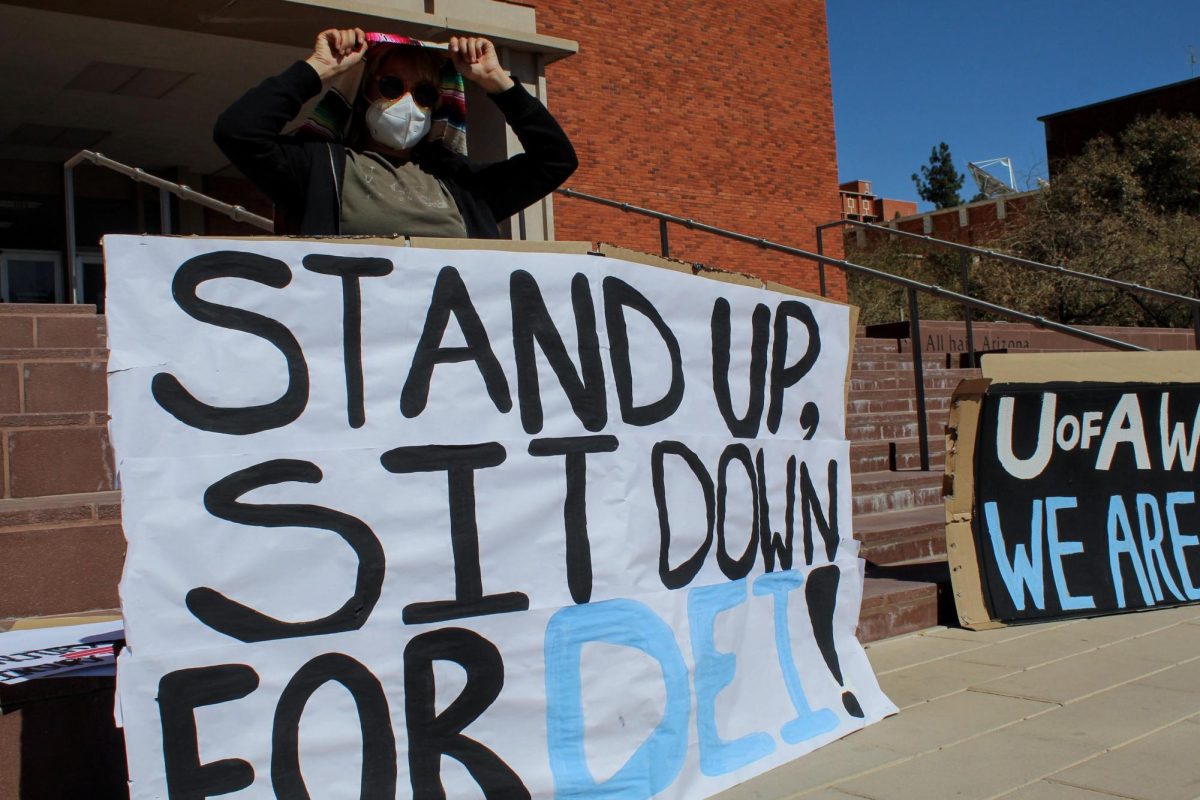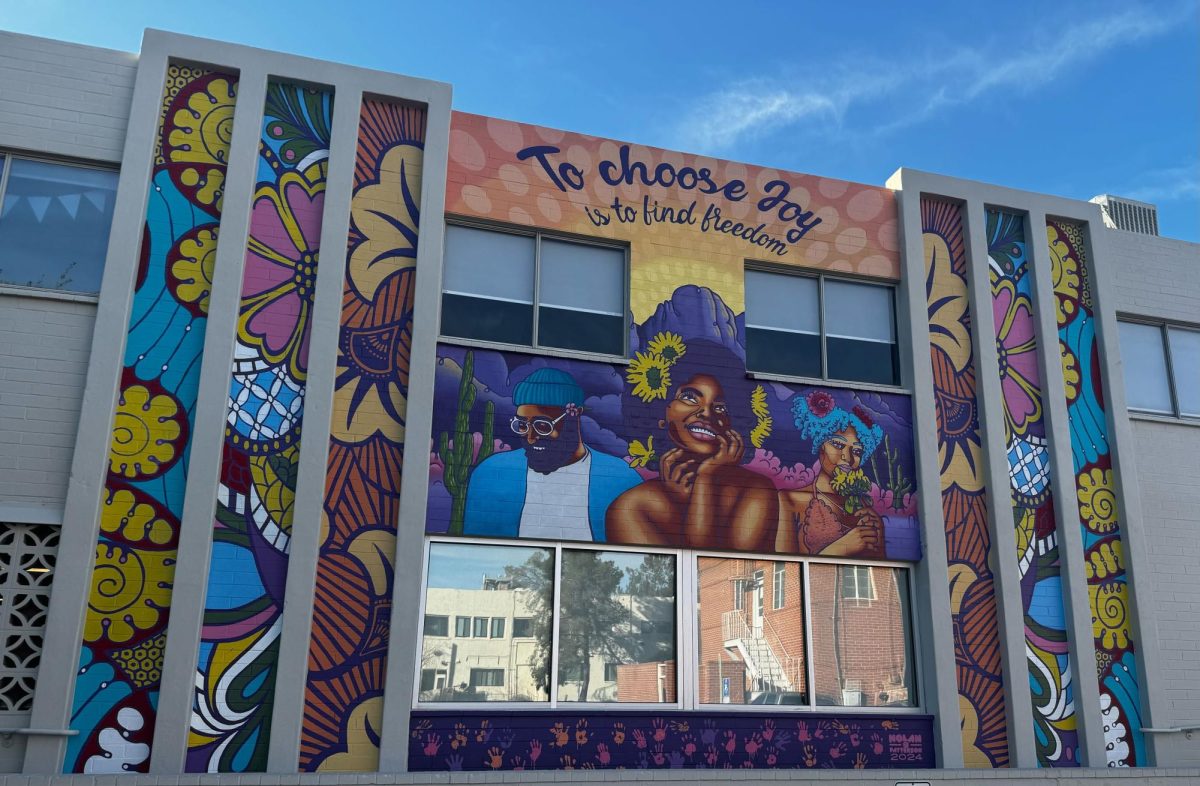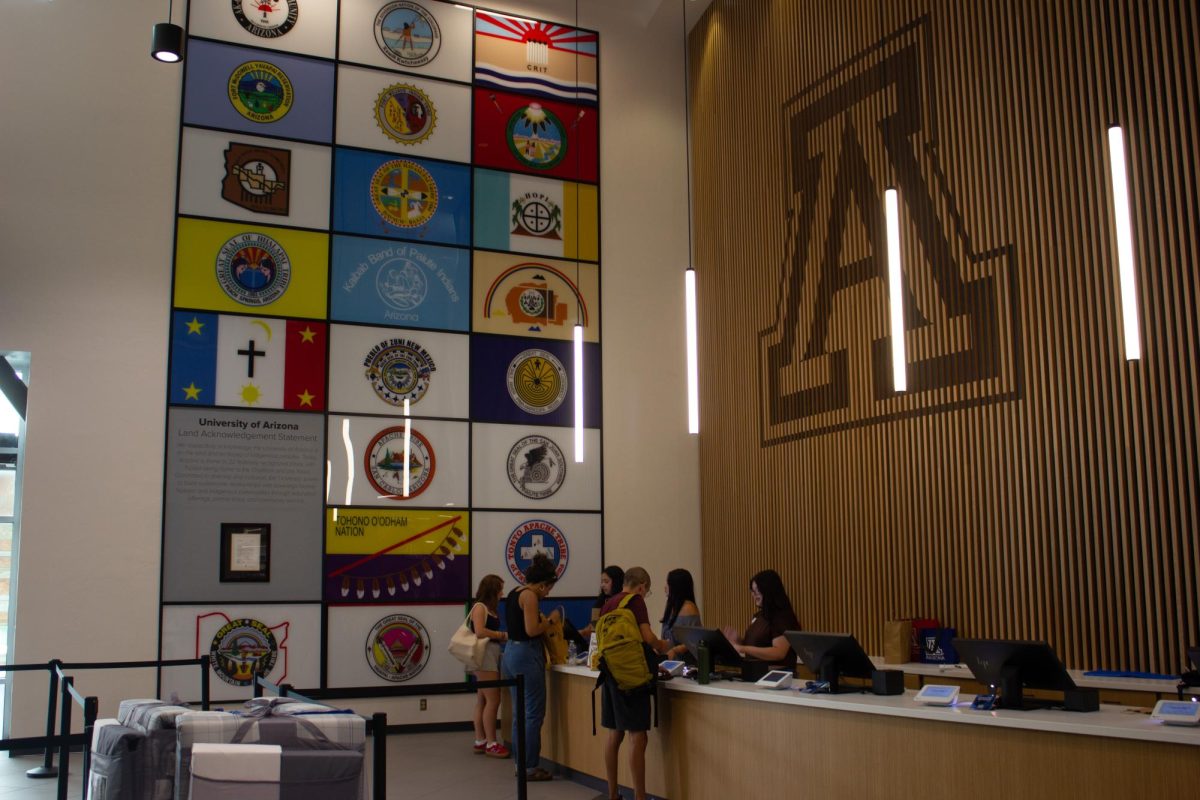A crowd of nearly 150 filled the seats of an auditorium in the Cesar E. Chavez building to discuss issues of free speech in today’s society during the “Express Yourself or Suppress Yourself” event hosted by the UA branches of Turning Point USA, STRIVE and the Ayn Rand Institute.
Panelists Dave Rubin, Michael Shermer and Steve Simpson drew a large crowd at the panel on Wednesday night.
Rubin, known for his popular YouTube show, The Rubin Report, which challenges the idea of political correctness and promoting free speech, drew many fans to the event. Shermer is a Presidential Fellow at Chapman University and publisher of Skeptic Magazine. Simpson, director of Legal Studies at the Ayn Rand Institute, offered a legislative perspective on the panel, weighing in on the defense of free speech under the law.
Conversations about the impossibility of trans-identity, over-victimization of historically oppressed groups and a general hatred of all things media circulated through the room as attendees awaited the panelists.
The crowd erupted in applause as the panelists entered, but as the conversation progressed, a contrast developed between the audience discussions and the panelists’ topics.
RELATED: Panel of journalists discuss fake news at SPJ event
Rubin said that he is a libertarian and that he subscribes to liberal ideas although not “left” ideas. His fellow panelists nodded in agreement.
One of his recent videos, ‘The Left is No Longer Liberal’, had nearly 464,000 views on YouTube at the time this story was published.
The three speakers advocated for free speech in the sense that everyone has the right to speak and be heard, whichever side of the political line they are on and whatever their topic may be.
Free speech on college campuses in particular have been brought to the forefront of national conversation by recent events such as rioting at the University of California, Berkeley that ensued Milo Yiannopoulos’ scheduled talk, and the canceling of Ann Coulter’s speech.
In Simpson’s opinion, these events were not taken seriously enough under the eyes of the law. Protests that turned into riots resulting in violence should be stopped, not the speeches, Simpson argued.
“If things continue the way they are going,” Simpson said, “we will see some real erosion in free speech.”
Shermer pointed out that while universities don’t have to invite controversial speakers like Yiannopoulos, if they do invite them, then the appropriate platform should be given.
“In order to have a right to listen, you must first have a speaker to listen to,” Shermer said. “You are not allowed to riot. Police and authorities need to draw the line at violence and force.”
Many of the questions during the Q&A portion of the event asked about the ability to say things that others might find offensive. Questioners argued remarks that could be interpreted as racist, homophobic or misogynistic should be okay to say because of freedom of speech.
While such speech it is allowed by the law, the panelists spoke to the importance of backing up one’s argument. Shermer drilled home the notion that if a hateful statement has no facts behind it, then it is irrelevant and has no functioning purpose or need.
“I get ‘if your lives matter then what about mine?’” Shermer said. “This idea divides people up. But if you can’t articulate on a half a dozen points, then what have you got?”
Rubin, however, did invite this kind of debate with a tweet he posted just before the event started.
Exercising Free Speech at @UofA with @michaelshermer and @ssfreespeech. Join us and say mean things during the Q&A! https://t.co/5Ujh85THzG
— Dave Rubin (@RubinReport) April 20, 2017
Simpson explained why he thinks free speech on college campuses has come under wraps recently, concerning the fear of being offensive taking control of freedom of speech and opinion.
“It is a vocal minority of students and a complacent majority who have been guilted into thinking ‘I can’t talk back to these people because they’ve been oppressed in some way,’” Simpson said.
Much of this conversation was started by a hugely popular opinion column in The Atlantic called ‘The Coddling of the American Mind’ by Greg Lukianoff and Jonathan Haidt. The column criticizes safe spaces and trigger warnings, speaking of an over-sensitized youth who are offended by everything. Shermer voiced his shared concern about young peoples’ reactions to difficulties that they face at the panel event.
“The world is hard,” Shermer said. “There is always going to be someone better than you. It’s easy for me to stand up here and say buck up. That is something I worry about.”
RELATED: Fake news is changing the news media landscape
He further went on to describe the Halloween costume scandal at Yale, concerning advice over culturally offensive costumes.
“When I went to college and lived in the dorms, the whole pushback was leave us alone and don’t be out parents,” Shermer said. “Now kids want to be told what they can wear on halloween, they want administrators and dorm leaders to be their parents.”
Shermer’s suggested solution to this is open debate. As an advocate for educated debate, he urged students to honor free speech and actually listen to what each other have to say.
“You might be completely wrong,” Shermer said. “The only way to find that out is to have someone tell you that you are wrong and then you will check what you believe. On the other hand, you might be completely right but you don’t know how to defend yourself.”
This was a point that all of the panelists could agree upon. Rubin highlighted the importance of being informed, especially while engaging in live debate with experts on his show.
“The answer is knowledge,” Rubin said. “The truth ultimately will cover all shitty ideas.”
Rubin encouraged the audience to create their own YouTube videos and share their ideas.
“Say what you believe,” Rubin said. “Put your voice out there, that’s all I’m doing.”
Follow Tirion Morris on Twitter.









